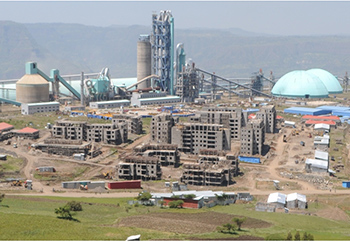Ethiopia: Construction materials scarcity no longer a challenge, but there is a need for sophisticated construction materials
Ethiopia Sector Analysis
Ethiopia: Construction materials scarcity no longer a challenge, but there is a need for sophisticated construction materials
The scarcity of construction materials was also among the serious challenges for the construction sector in general which also faced the real estate sub sector a few years ago. The coming of Derba Cement – the major cement supplier (52% market share) with a competitive price – has solved the problem, although GIFT Real Estate argues for using ‘sophisticated’ construction materials.

Ethiopia: Construction materials scarcity no longer a challenge, but there is a need for sophisticated construction materials
By Bewket Abebe
ADDIS ABABA – The scarcity of construction materials was among the serious challenges for the construction sector in general which faced the real estate sub sector a few years ago. Fortunately, the coming of Derba Cement – the major cement supplier (52% market share) with a competitive price – has solved the problem, at least for the time being.
“We offer door-to-door delivery and with our good quality of cement and low price, we dominate the market. We are now the cost leader as well as the price leader. Demand is growing around 22 to 23% and with different regional policies by the government, we see high demand. Thus we are planning to build a second plant with a capacity of 8,000 tons per day,” says Haile Assegide, Executive Director of Derba Cement.
The government also seems to open the sector for the foreign investors so as to address delivery issues. Until recently, all the developers who are issued licenses in this particular sub-sector had to be local investors.
This however cannot be a good solution according to Gebreyesus Igata, owner and general manager of GIFT Real Estate, a real estate developer in Addis Ababa. He believes once construction companies start using ‘sophisticated’ construction materials instead of doing ‘business as usual’ with traditional cement stones, it will easily address the challenge.
Addressing the challenges of the real estate sector in Ethiopia
To address the problems that are facing the real estate sector in Ethiopia, the government is amending a new proclamation which is currently tabled for discussion to the council of ministers. The proclamation addresses the issue of delivery, which has become a bottleneck to the sector.
According to the proclamation, any investor who wants to come to develop a real estate with an advance payment is expected to construct at least 70 % of the construction. Before that, the developer cannot even advertise selling of shares in any mass media.
The draft proclamation also clearly states the time frames for handing over of the plots to investors. Unlike in the past when handing over of the land by the concerned government offices had been full of red tape, the new law states that the offices are expected to hand over the required plot within 30 days from the date of the first payment, after such land requested by the real estate developer is granted.
 To address the disappointment on the side of the clients, the new proclamation also demands the real estate developers to provide a legitimate warranty approved by a bank guarantee against any payment effected by the client.
To address the disappointment on the side of the clients, the new proclamation also demands the real estate developers to provide a legitimate warranty approved by a bank guarantee against any payment effected by the client.
In spite of the fact that the real estate sector in Ethiopia has been prone to inconvenience which lead the people to distrust, the newly established real estate developers are also coming up with new ideas. A recent real estate development (Noh Real Estate) joining the sector currently came up with a way that transfers the houses after completion.
In addition to amending the proclamation, the government also seems to open the sector for the foreign investors so as to address delivery issues. Until recently, all the developers who are issued licenses in this particular sub-sector had to be local investors. Though the investment law of the country does not clearly state that foreign investors are not allowed to be engaged in this particular sector, it does not also encourage them to be part of the real estate development in Ethiopia. Recently, however, the government has started negotiating with one Chinese company which is a show case of the government’s interest in seeing foreign investors involved in the real estate sector.
FAIR USE POLICY
This material (including media content) may not be published, broadcasted, rewritten, or redistributed. However, linking directly to the page (including the source, i.e. Marcopolis.net) is permitted and encouraged.